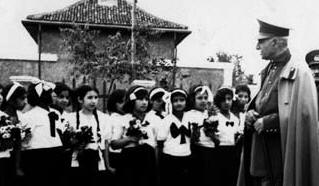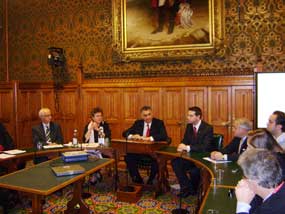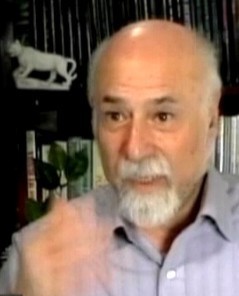Iran's new leaders built their state on foundations of violence and corruption, making millions of us refugees

Life for me as I had come to understand it ended on 15 November 1977. Standing next to a group of young elementary school children from one of Washington DC's inner-city schools on the Ellipse facing the South Lawn of the White House, I was one of a thousand greeting the visit of Mohammad Reza Shah Pahlavi and his Queen to the United States. The children were waving the US flag and I, a university student, the lion and sun flag of Iran. Within seconds of the 21-gun salute sounding, hundreds of white-hooded and masked protestors viciously charged into us with brandishing sticks with nails that used to hold their placards and shouting "Khomeini come back" and "Down with Imperialism". The streets around the area turned into a bloody battleground with club wielding anti-shah protestors felling peaceful demonstrators. Tear gas and smoke from burning garbage transformed the Indian summer day into a hazy and mordant one. By the end of the clashes, more than 120 people had been injured. Although this was a taste of what was to unfold for the ensuing 30 years in Iran, no one could have imagined the degree of brutality and tragic consequences of the revolution which ousted the monarchy and established the theocracy in Iran. Along with millions of Iranians, I became a refugee. Our ranks included technocrats, military personnel, entrepreneurs, artists, writers and bankers. When the revolution turned against its own children we were joined by socialist and liberal elements comprising large number of professionals, intellectuals and academics, young men who fled military service during the Iran-Iraq war and young women and families who were stifled by the harsh Islamic laws enacted in Iran. Our numbers further swelled following the crackdown on the student movement, the weakening of the reformist faction and the worsening of the economic situation. The Islamic revolution, which promised to bring democracy and prosperity to Iran, instead built its foundations on the rubble of chronic repression, poverty, mismanagement and corruption. Images of the corpses of hundreds of thousands of young boys strewn across the deserts of southern Iran holding plastic keys "to open the gates of heaven", men and women hanging from cranes, dissidents assassinated abroad, intellectuals murdered at home, razed mosques belonging to clerics advocating separation of mosque from state, drug addicts languishing on the streets, underage girls smuggled for prostitution to neighbouring states by gangs, ethnic minorities being gunned down, burnt-out university dorms and the scars of torture on the bodies of those who dared to object: these shall forever symbolise the reactionary, brutish yet inept rule of those in charge of the revolution and the Islamic Republic. The cause that fired the revolution in Iran fed off the fortunes and opportunities of ordinary Iranians. However, 30 years later the theocracy can no longer afford to stoke the revolutionary zeal of its followers. Moreover the Islamic Republic is perplexed: should it act as a nation-state or as the embodiment of a revolution with universal messianic pretensions? Is it a country or a cause? Today the real heartbeat of power in Iran is no longer with the ayatollahs but can be felt in the aspirations of its people, where Iranian nationalism has taken precedence over the regime's revolutionary fundamentalism. The drivers of change are not only found in the ranks of the opposition abroad and the dissidents at home. They are also becoming more prominent within the regime. Whether and how these elements will ultimately join forces to bring about a transformation of power within Iran and to build the foundations of a modern nation-state at peace with itself and it neighbours is a crucial question. If they do, it will have an impact on the region and beyond.
The vast majority of Iranians in Britain are united by a common story of dislocation
My father boarded a plane at Tehran's Mehrabad airport in January 1979, bound for London. He did so – like many of the estimated 100,000 who left their country for Britain in the aftermath of the Iranian revolution – without a full knowledge of the new life he must soon inhabit, or the new person he must become, on these shores. Fast forward through 30 problematic years – through the Salman Rushdie fatwa, the 15 British sailors captured in 2007, and (clear winner in the most bizarre stakes) President Ahmadinejad's Christmas Day message – and have that generation of Iranian exiles come to an understanding with their new home, and its inhabitants? They are a diverse lot, ranging from affluent members of the former Shah's establishment (see them roam Kensington High Street), to asylum seekers (see them in the pages of the Daily Mail). Still, the vast majority of Iranians in Britain are united by a common story of revolution and dislocation. It's a shared bond around which we might have expected to see the emergence of a distinct, and well-articulated, British-Iranian identity.But three decades on, it seems to me that such an identity is yet to be defined. Indeed, I'd argue that British-Iranians are this country's most misunderstood ethnic group. Over the past few months, I've been talking to a wide range of Iranians in the UK – from former revolutionaries, to businessmen, teachers and artists, as well as second generationers like me – for a BBC Radio 4 documentary on the British-Iranian experience. In place of an authentic British-Iranian identity, most encountered a conveyor-belt of wild misconceptions. That Iranians hate the west (in fact, David Beckham is hero to a generation of young Tehranis with spiky haircuts); that Iranians are Arabs (this would be fine, only that, you know, we're just not); that Ahmadinejad wants to, "wipe Israel off the map" (not if you consult your Persian/English dictionary). Few other British immigrant communities, surely, perform such a difficult – and sometimes frustrating – tightrope walk of identity. Iranians in Britain feel misunderstood, that much is clear. But I wonder if we could do more to help our situation. If we could become a little better, in short, at being immigrants? Trouble is, British-Iranians have tended to cling too hard to the differences in class, politics and religion that divided us in Iran, and eschew any sense of a diaspora community. No surprise, then, that we've lacked regard for – and kept largely silent about – our shared story. Where are the memoirs of Iran that American-Iranians seem unable to stop writing? Where, after all, is the great British-Iranian novel? A few of us have even decided it would be best to keep our origins hidden: cue jokes about the British-Iranian bachelor/uncle/cousin who pretends (badly) to be Italian. I wonder how many Cif readers know a British-Iranian, without knowing it? So this year, 30 years after the events that drove so many of us here, I call on British-Iranians to help reconfigure both our own identity, and that of our home country. First, tell at least one person of your own family's story. Then point them, say, towards the burgeoning, US-influenced hip-hop scene in Tehran. Explain that we, too, have no idea why Ahmadinejad won't take off that jacket. Speak out: we have nothing to lose but our "Italian" relatives.
A comment By : BlackFreighter - 12 Jan 09, 8:12pm
Hi David,
I am a British-Iranian man brought here as a babe in arms immediately after the revolution and so I will listen to your programme with interest. I would agree that no British-Iranian identity has emerged, nor an articulate young generation. There isnt any leadership from the older generation either. This isnt just in the UK. Look at California where Iranian numbers are much larger and many Iranians lived in before the revolution - there is only one Iranian-American politician of any note on the US and thats the Mayor of Beverly Hills. In London, the Mayor of London gave nourruz greetings to the Kurds - not the Iranians. I doubt anyone knew it was Iranian new year. I think the problems are threefold:
1. Young Iranians who are successfull and who seem to be able to operate effectively within UK society seem to be heavily anglicised - to the point of not retaining any vestigal traces of Iranian culture and not speaking the language. As someone who is completley integrated I think integration is important but many choose (as is their choice) to have no real tie to Iranian culture at all - so no synthesis is possible. Young Iranians who have retained their culture have not adopted any British culture and are effectively expats - they are not capable of functioning particularly well in British society with many of them depending on Iran-related jobs or family business type jobs - not a job in an office with other British people.
2. Older Iranians persist in many of the habits and behaviours of old Iran and make no attempt to integrate or create a new British-Iranian identity - in fact they pride themselves on their expat identity and mock anyone who seeks integration or describes themselves as loyal to Britain. Many of them who are involved in any community group or organisation behave dishonestly and corruptly, so these organisations do not act as any form of civil society - reflecting the lack of belief in, and lack of, civil society in pre-revolutionary Iran. I have been deterred from attending certain organisations by the knowledge that the people involved were basically dodgy.
3. Politics. Iranians are still divided by politics - the royalists, liberals/nationalists, communists and MKO all hate each others' guts. And the people who just want social/cultural activities (to an extent rightly) resent any attempt to co-opt them to a political cause. The MKO in particular have a record of infiltrating organisations and steering them to their agenda as well as setting up front organisations. For example, I am a lawyer - there was some Committee or Group of Anglo-Iranian lawyers. It became clear it was an MKO front and quite political - not a networking or professional organisation at all. The MKO also, though representing a minority, are by far the most organised expat group of Iranians in the world and so are hard to avoid - which many of us frankly want to. So that kind of community engagement is difficult.
A Comment : By alimostofi - 12 Jan 09, 10:04pm
Obviously no one here has met an Iranologist. You do not lose your identity just because you love a country. I had a Persian Language teacher, who was called Rev Sharpe, who lived and taught Cuneiform in Shiraz University. When he retired the Shahanshah invited him to the Palace and asked him how long he had been in Iran. He replied forty something years, I do not remember now, but it was more than the Shah. So the Shah felt pretty bad that they had served him a cup of tea instead of an estekan. Anyway Rev Sharpe's love for Iran, is what has kept me loving my country, even though I cannot go back. People like Sir Henry Rawlinson are an inspiration to all of us, who want to find out about ancient Iran and bring it all alive. You do not have to have a parent as a Chemist to be a Chemist. Many Iran lovers here are not Iranian.
Regarding the so called Revolution : It was not so much a revolution, as much as it was the loss of the Shah and all the technocrats. The generation of the Shah were all technocrats and many did not venture into politics. The argument was that there were some very basic things that had to be done, no matter what you politics were. Love of the country and modernisation were paramount. When the Shah died many of the technocrats left Iran, and that was what crushed Iran. To this day much of their work has not been done.

















































































































No comments:
Post a Comment
Thank you for your comment. This comment will be posted after it has been modarated by the editor.